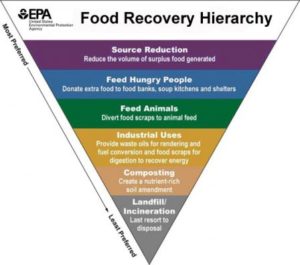
Much is being made about fighting food waste these days, and we’re glad to see it! The Environmental Protection Agency named 15 companies to its list of 2030 Food Loss and Waste Champions (Bon Appétit is one), we’ve seen pop-up dinners made of food waste, a food waste documentary (with another one, starring Anthony Bourdain, in the works), and now Whole Foods even offers a vegetable butcher, a pro who will efficiently (and presumably less wastefully) chop up your produce.
No one wants to waste food, but even if you’re well aware of the environmental impacts of food waste, it’s easy to backslide in your day-to-day waste reduction practice. A recent study at Ohio State University revealed that understanding the environmental ramifications of wasting food is effective in helping diners waste less food — until they know their leftover food is going to be composted, then they get complacent. It seems that knowing our food will avoid a landfill and become something that seems “green” (like compost) makes it easy to forget what we’re really wasting: all of the water, land resources, soil nutrients, labor, fuel, livestock feed, and energy that went into making that food. (Want to know more? Read this report (PDF) from the Food and Agriculture Organization of the United Nations.)

Plus, even compost emits some greenhouse gases — the process of aerobic decomposition (meaning “with oxygen”) that occurs in worm bins or when you turn your compost to aerate it, releases carbon dioxide. Waste in landfills, meanwhile, decomposes anaerobically — or without oxygen — and emits methane, a greenhouse gas that has an effect on atmospheric warming that’s 25 times more potent than carbon dioxide. So while composting food waste remains superior to putting it in landfills in terms of greenhouse gas emissions, we still think it should be a last resort.
Fight compost complacency by training to be a Food Waste Warrior. Here are some tips from the Natural Resources Defense Council at SaveTheFood.com — they’re kryptonite for complacency:
Shop with a plan: Not only does planning your meals prevent random vegetables from liquefying in the back of your fridge, it also saves you money. Like, a lot of it — about $371 a year, according to the NRDC. That’s enough for a flight from Tokyo to Budapest.
Love your leftovers: There’s more food in America’s landfills than anything else. Food waste decomposing in landfills emits methane, a greenhouse gas 25 times more powerful than carbon dioxide. Instead of tossing those leftovers, love them. Our favorite topper to turn any leftover into a treat? An oozy egg.
Upcycle scraps: Turn stalks into pickles and peels into chips. More ideas for turning nibs and nabs into deliciousness here.
Learn to decipher dates: “Sell By” really doesn’t mean “Throw Out By.” Here’s how to get literate about date stamps.
Push pause: With the freezer. That humming box in your kitchen isn’t just an appliance, it’s a time machine that will instantly whisk you back to last week’s fabulous dinner. With a few tactics you can extend the life of almost any food, and have meals on hand even when you don’t want to cook.
Store smart: Foods can be fickle. Some like to live in a bag, others like to be exposed to air. Consult this handy food storage directory to keep foods fresh longer.
With a few simple changes to your day-to-day practices, you can fight compost complacency and save precious resources like water and energy, and help make a serious dent in greenhouse gas emissions. (And, yeah, you’ll save money, too.)